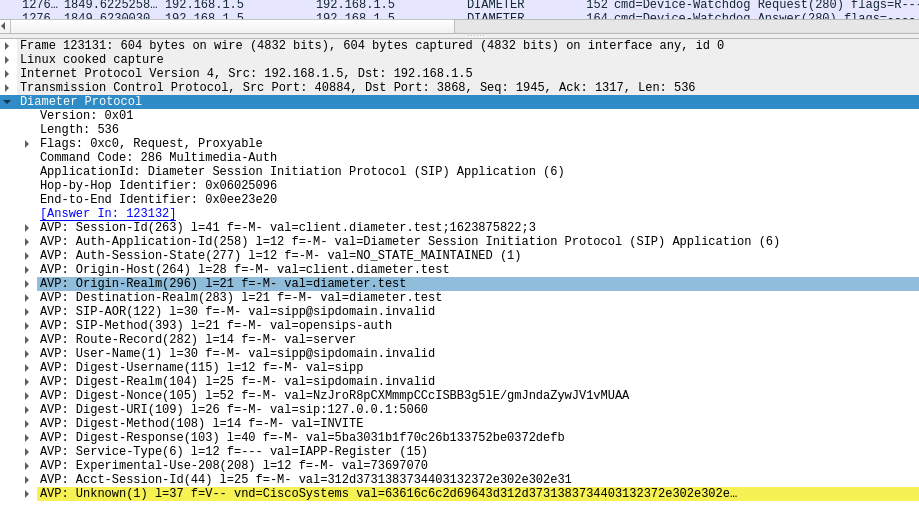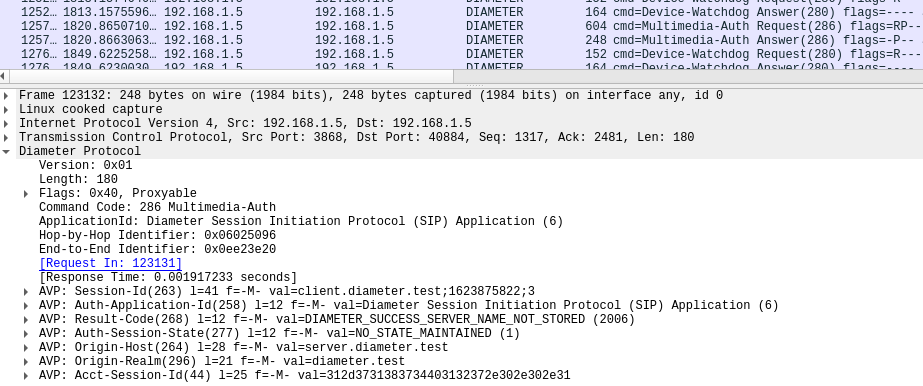|
Documentation |
Documentation -> Tutorials -> Diameter Authentication and AccountingThis page has been visited 8961 times. How to configure and deploy Diameter Authentication and Accountingby Liviu Chircu Table of Content (hide) 1. Setting up freeDiameterThis tutorial has been written for a Xubuntu 20.04 LTS, which comes with freeDiameter v1.2.1 packages, which is the only version we've tested so far. Other distros, such as Debian 10, are also known to offer standard package-based support for freeDiameter v1.2.1, so they are expected to be compatible just as well.
apt install freediameter 2. freeDiameter ClientThe client side is represented by both the "aaa_diameter" OpenSIPS module and the freeDiameter client library. In this section, we will perform the necessary steps in order to configure the freeDiameter client library. 2.1 DNSIt seems freeDiameter is strongly tied to DNS hostnames, so let's add entries to the 192.168.1.5 client.diameter.test 192.168.1.5 server.diameter.test 2.2 PackagesThe aaa_diameter OpenSIPS connector module makes use of the libfdcore.so and libfdproto.so shared libraries. These libraries can be installed via: sudo apt install libfdcore6 libfdproto6 2.3 Creating TLS CertificatesEven though we will disable TLS support, freeDiameter will not start unless we plug some certificates into it. So let's clone the freeDiameter project, which contains some nice built-in helper tools. For ease of use, we will generate wildcard-certificates resembling "*.diameter.test": # clone the freeDiameter source code sudo apt install mercurial mkdir -p ~/src; cd ~/src hg clone http://www.freediameter.net/hg/freeDiameter cd freeDiameter hg checkout 1.2.1 # generate a certificate/key pair for the client cd contrib/PKI/ca_script2 make init topca=my_diameter_ca make newcert name="*.diameter.test" ca=my_diameter_ca # notice that the certs have been created under the "ca_data" directory (I suggest you browse its structure a bit, it's quite fun!) # Extra: running "make help" will list all commands available within this tool 2.4 The freeDiameter client configuration fileEdit
Identity = "client.diameter.test";
Realm = "diameter.test";
Port = 3866;
SecPort = 3867;
No_SCTP;
TLS_Cred = "/path/to/freeDiameter/contrib/PKI/ca_script2/ca_data/my_diameter_ca/clients/*.diameter.test/cert.pem",
"/path/to/freeDiameter/contrib/PKI/ca_script2/ca_data/my_diameter_ca/clients/*.diameter.test/privkey.pem";
TLS_CA = "/path/to/freeDiameter/contrib/PKI/ca_script2/ca_data/my_diameter_ca/clients/*.diameter.test/certchain.pem";
ConnectPeer = "server.diameter.test" {
No_TLS;
};
Notice how we instruct the client to establish a TCP-based Diameter connection to the "server.diameter.test" Diameter peer. 3. freeDiameter ServerThe server side is represented by the app_opensips freeDiameter application, running within the freeDiameter daemon. 3.1 Compiling app_opensips
apt install mercurial cmake flex bison gcc make build-essential \
g++ libfreediameter-dev libidn11-dev ssl-cert debhelper fakeroot \
swig libsctp-dev libgcrypt20-dev libgnutls28-dev
# for Digest Auth support, the MySQL devel library is needed. On Debian, for example:
apt install libmariadb-dev libmariadb-dev-compat
cd /path/to/freeDiameter
# copy or symlink the app_opensips directory into the freeDiameter extensions/ directory
cp -r /path/to/opensips-master/modules/aaa_diameter/app_opensips extensions/app_opensips
# enlist the app_opensips extension for compilation
cat >>extensions/CMakeLists.txt <<EOF
FD_EXTENSION_SUBDIR(app_opensips "OpenSIPS Diameter integration for SIP Authorization, Authentication (RFC 4740) and Accounting" ON)
EOF
# also, fix a strange compilation issue specific to this revision, by applying this patch:
patch -p1 < <(base64 -d <<EOF | gzip -dc
H4sIAAAAAAAAA4WSX0/bMBTFn8mnuHQaoqSBOAXCgjY1yx/IqOwoSdn2ZLmxQy06ByUpT3z4eQ1M
ooVyX2z5nHNt/a65rCqwGnDK+QV3ETu1zzgs5bziZd2Ik7bsHo5Lw7IsYCebx3s56yAXD+CcAkLe
2PHGCBwbnYNpX9i2YZomzLdTxWIFP1YKkAs28tDYQ190ykE6NdapyQQs5JzZIxfM53UyMWBP15F4
FKqDrxCH0W1KA/yLRllGsstenjeC3f/bG9YnWXFRAZmGNA+KlOYkuIkK6qeJYWoNtCiV4IdvGIbw
9AT7L4ZejHBIYz+ZRiGNbiNcDNcXlqwVsGnw+rcUmR9ENIy+z64O49l0OoJBJkohHwXfioCqO1nJ
knWyVoPh5XYHH2PyO8FXugvoWgoFHnxerAajPmt9axVtheK0YnIp+HHbVlS77rqFbtcTdZ+Juh8Q
za9nRUh+4k2outZc1U6w+zvJHhzAK7CYFEmcBH6REJzTvCBp+h7iHdY3kCc4JlvId7R4NYIR/GHN
vVR30C0EsLatS7kWQCoQTVM30HasE/9H9f6//Aug0Y8DXwMAAA==
EOF
)
# create a build configuration (one-time operation, feel free to disable some of these flags or include others!)
mkdir fDbuild
cd fDbuild
cmake \
-DBUILD_TEST_APP:BOOL=ON \
-DBUILD_DBG_MONITOR:BOOL=ON \
-DSKIP_TESTS:BOOL=ON \
-DCMAKE_BUILD_TYPE:STRING=Debug \
..
# now build both freeDiameter and its extensions (any time you change the app_opensips code)
make -j
If done correctly, you should be able to see the "app_opensips.fdx" freeDiameter extension module: [liviu@Z370 fDbuild]$ ls extensions/app_opensips.fdx -la -rwxrwxr-x 1 liviu liviu 112048 iun 16 22:58 extensions/app_opensips.fdx Congratulations for making it this far, as the hard part is over! 3.2 DNSIf your freeDiameter server is running on a separate machine, edit 192.168.1.5 client.diameter.test 192.168.1.5 server.diameter.test 3.3 PackagesAs we will be using the "dict_sip" freeDiameter extension, install the appropriate package (FWIW, you've already built it in the previous step, but it's nicer this way): sudo apt install freediameter-extensions 3.4 The freeDiameter server configuration fileEdit
Identity = "server.diameter.test";
Realm = "diameter.test";
Port = 3868;
No_SCTP;
# Notice we're using the same wildcard certificate!
TLS_Cred = "/path/to/freeDiameter/contrib/PKI/ca_script2/ca_data/my_diameter_ca/clients/*.diameter.test/cert.pem",
"/path/to/freeDiameter/contrib/PKI/ca_script2/ca_data/my_diameter_ca/clients/*.diameter.test/privkey.pem";
TLS_CA = "/path/to/freeDiameter/contrib/PKI/ca_script2/ca_data/my_diameter_ca/clients/*.diameter.test/certchain.pem";
# Load the standard SIP AVP dictionary, as well as the app_opensips module!
LoadExtension = "/usr/lib/freeDiameter/dict_sip.fdx";
LoadExtension = "/path/to/freeDiameter/fDbuild/extensions/app_opensips.fdx";
# Per your preference: the server may optionally also establish the Diameter connection to OpenSIPS on startup (useful after a server restart)
ConnectPeer = "client.diameter.test" {
No_TLS;
port = 3866;
};
Let's test that app_opensips boots properly by launching freeDiameter in full logging mode, in a separate console: $ freeDiameterd -dd 23:18:24 NOTI libfdproto '1.2.1' initialized. 23:18:24 NOTI libgnutls '3.6.13' initialized. 23:18:24 DBG Core state: 0 -> 1 23:18:24 NOTI libfdcore '1.2.1' initialized. 23:18:24 DBG Generating fresh Diffie-Hellman parameters of size 1024 (this takes some time)... 23:18:24 DBG Loading : /usr/lib/freeDiameter/dict_sip.fdx 23:18:24 DBG Extension 'Dictionary definitions for SIP' initialized 23:18:24 DBG Loading : /home/liviu/src/freeDiameter/fDbuild/extensions/app_opensips.fdx 23:18:24 DBG opensips entry 23:18:24 DBG [AUTH] connected to MySQL 23:18:24 NOTI All extensions loaded. 23:18:24 NOTI freeDiameter configuration: 23:18:24 NOTI Default trace level .... : +1 23:18:24 NOTI Configuration file ..... : /etc/freeDiameter/freeDiameter.conf ... If it worked, make sure to give yourself another pat on the back! You are an excellent developer! 4. OpenSIPS configurationAs long as you can compile aaa_diameter with the below command, you only need to worry about the opensips.cfg file after this step: make modules module=aaa_diameter make[1]: Entering directory '/home/liviu/src/opensips-3.3/modules/aaa_diameter' Compiling aaa_impl.c Compiling aaa_diameter.c Compiling peer.c Compiling app_opensips/avps.c Linking aaa_diameter.so make[1]: Leaving directory '/home/liviu/src/opensips-3.3/modules/aaa_diameter' 4.1 Digest AuthenticationFor now, app_opensips will connect on startup to a MySQL OpenSIPS database, hardcoded to "mysql://opensips:opensipsrw@localhost/opensips", where it will access the subscriber table data, so make sure to provide the necessary infrastructure. As the application becomes more sophisticated, this section will also be updated. Here are the relevant opensips.cfg sections to perform SIP digest authentication via Diameter:
log_stdout = yes # very important, to see the freeDiameter library logs
...
alias = udp:sipdomain.invalid:5060
...
loadmodule "auth.so"
loadmodule "auth_aaa.so"
modparam("auth_aaa", "aaa_url", "diameter:freeDiameter-client.conf")
loadmodule "aaa_diameter.so"
modparam("aaa_diameter", "fd_log_level", 0) # max amount of logging, quite annoying
modparam("aaa_diameter", "realm", "diameter.test")
modparam("aaa_diameter", "peer_identity", "server")
...
route {
...
if (is_method("INVITE")) {
...
if (!aaa_proxy_authorize("sipdomain.invalid"))
proxy_challenge("sipdomain.invalid");
...
}
}
...
4.2 AccountingAs of now, app_opensips will append each CDR to a hardcoded file path of "/var/log/freeDiameter/acc.log", rotating this file daily, around midnight. Also, there is no way of configuring the custom AVPs required by "acc_extra", however this section will be updated as soon as that is in place. To enable Diameter accounting support in your opensips.cfg file, make sure to set:
log_stdout = yes # very important, to see the freeDiameter library logs
...
loadmodule "acc.so"
modparam("acc", "aaa_url", "diameter:freeDiameter-client.conf")
loadmodule "aaa_diameter.so"
modparam("aaa_diameter", "fd_log_level", 0) # max amount of logging, quite annoying
modparam("aaa_diameter", "realm", "diameter.test")
modparam("aaa_diameter", "peer_identity", "server")
...
route {
...
if (is_method("INVITE")) {
...
record_route();
create_dialog();
do_accounting("aaa", "cdr");
...
}
}
...
|


